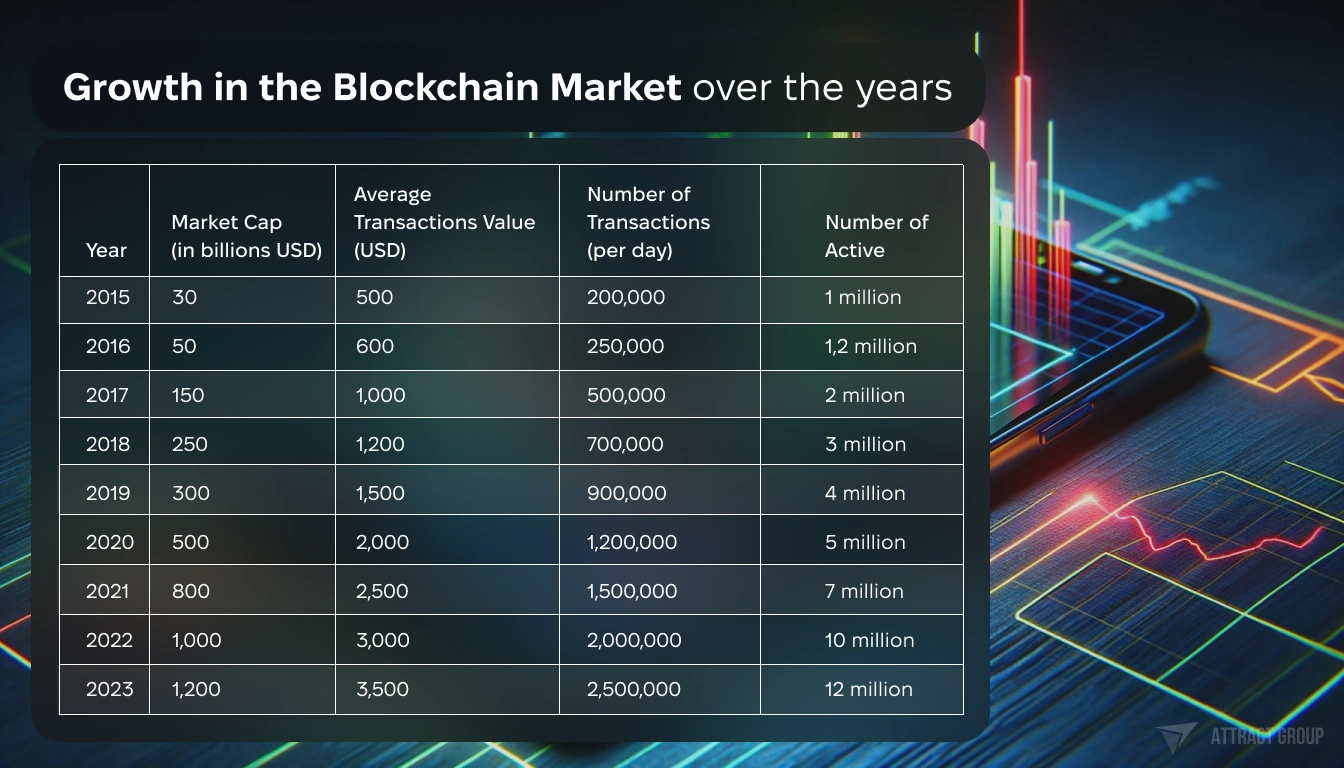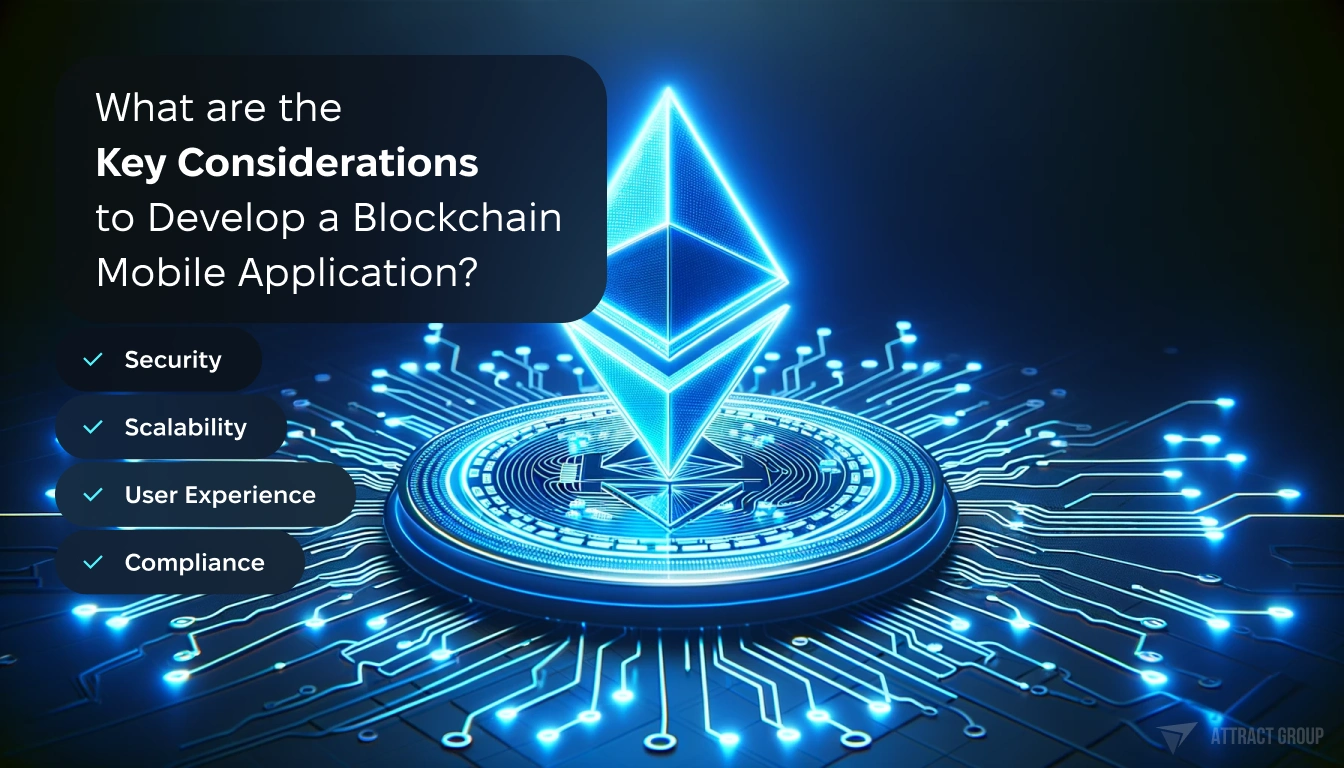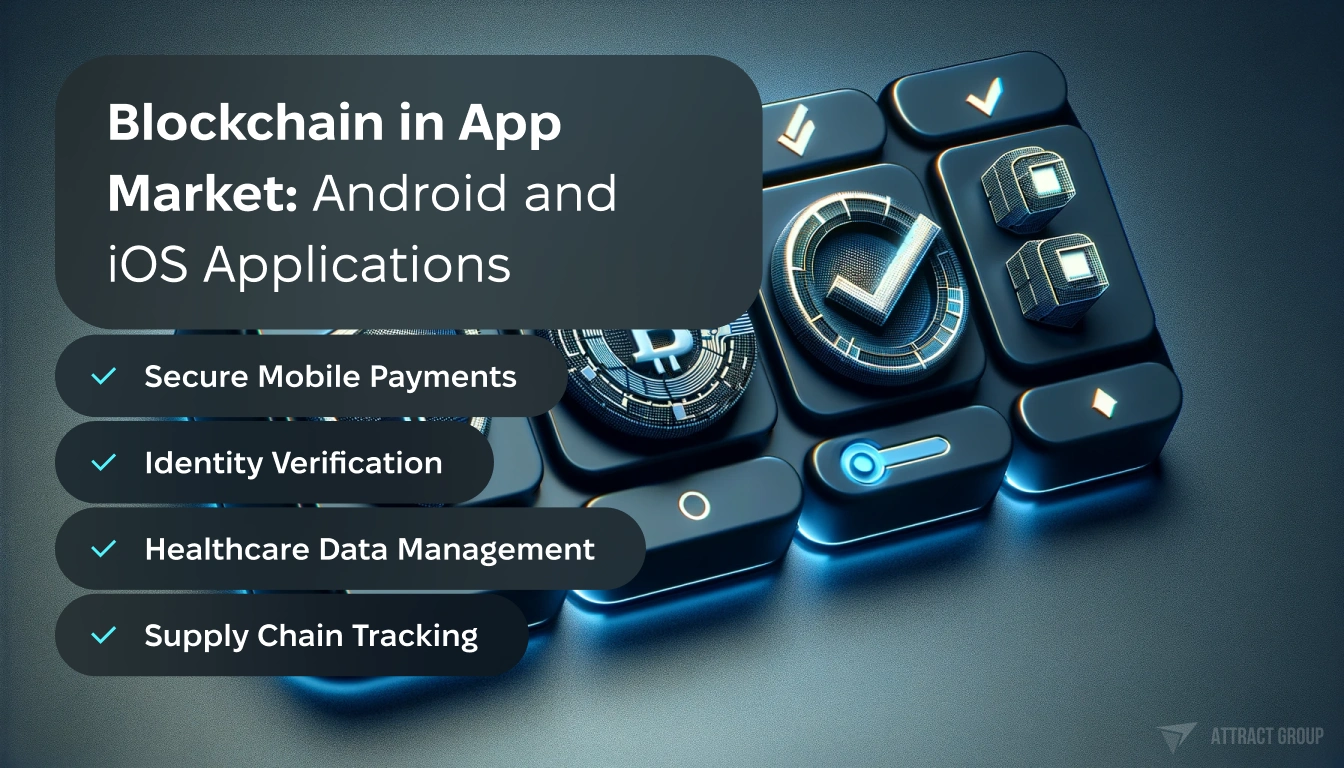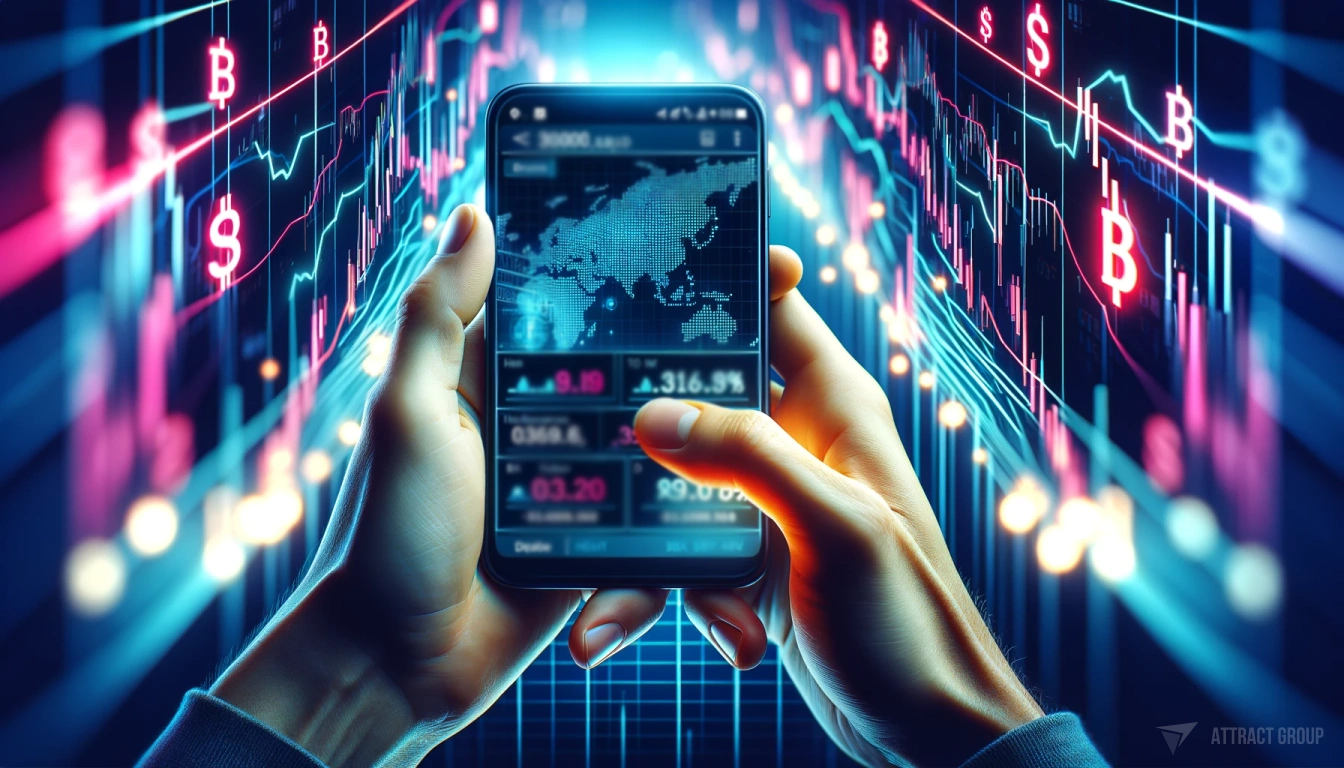Mobile App Development: Blockchain in Mobile Applications
 27 December 2023
27 December 2023The integration of blockchain technology in mobile app development represents a significant shift in how we approach secure and transparent digital transactions. Blockchain, essentially a decentralized ledger system, offers unparalleled security and transparency, making it an ideal technology to integrate into mobile apps.
Moreover, the global blockchain technology market is growing much rapidly, with increasing adoption across various industries. This surge in interest underscores the need for mobile app developers to become proficient in blockchain technology, ensuring they can meet the market’s evolving demands.
The overall blockchain market, which includes mobile apps, is growing rapidly. Valued at $10 billion in 2023, it’s projected to expand at an 87.7% CAGR until 2030, reaching $1.4 trillion according to the most recent stats. This significant growth, driven by increasing venture capital investments, signifies a robust interest in blockchain across various sectors, reflecting its utility in improving digital transaction safety and openness.

In sectors like finance, healthcare, and supply chain management, blockchain mobile apps offer a way to securely record and verify transactions or data exchanges, increasing trust and efficiency.
As per the reports by builtin and Mobile App Daily, usage of blockchain technology has widely increased in the industries like Financial Services, Payment Network, Defense, Healthcare for software development and app development.
The table below showcases how different major companies across these industries are leveraging blockchain-based apps in their operations and the anticipated growth in the blockchain enterprise app market.
| Company | Industry | Description of Blockchain Use |
|---|---|---|
| Circle | Financial Services | Online money transfer and cryptocurrency investment platform without exchange rate fees. |
| Paxos | Blockchain Infrastructure | Provides crypto brokerage and settlement services for securities and commodities. |
| Ripple | Payment Network | Uses blockchain for global money transfer; used by institutions like American Express and BBVA. |
| Mythical Games | Gaming | Creates games featuring blockchain-based true ownership of digital assets. |
| Lockheed Martin | Defense | Integrates blockchain in cybersecurity and software utilization; first U.S. defense contractor to do so. |
| Ford Motor Company | Automotive | Collaborates with automakers for blockchain use in automotive industry; tracks supply chain for EV battery materials. |
| Revenue Prediction | Enterprise App Development | Blockchain in Enterprise expected to cross $20 Million in revenue in the next six years. |
| Healthcare Apps | Healthcare | By 2025, 55% of healthcare apps to deploy blockchain for commercial purposes, with a market valuation projected to reach $5.61 billion. |
What is Blockchain Development? Basics and Principles
Blockchain development refers to the process of creating a decentralized digital ledger that records transactions across many computers. This ensures that any recorded data cannot be altered retroactively, without altering all subsequent blocks. At its core, blockchain is a network where data is stored in blocks, and each block is connected to the previous one, forming a chain. This structure makes blockchain inherently secure and transparent.
The development of blockchain applications, or blockchain apps, involves programming the rules of the blockchain system, known as protocols, and the creation of smart contracts that automatically execute when certain conditions are met. These features are fundamental to the development of blockchain-based mobile apps, which can range from financial services to supply chain management tools.
Blockchain potential extends across various sectors. It is not just limited to cryptocurrencies like bitcoin. In finance, blockchain provides a more secure and transparent way to handle payments and transfers. In healthcare, it ensures the integrity and confidentiality of patient records. Supply chain management benefits from blockchain by gaining enhanced traceability and accountability in product tracking.

Blockchain for Mobile App Development
Blockchain has rapidly become a dominant platform for mobile application development, with its market size valued at $10 billion in 2023. This growth underscores the rising demand for blockchain applications due to their enhanced security and transparency features particularly in industries like finance, government, healthcare, media, and entertainment. The surge in venture capital funding in blockchain technology further highlights its increasing popularity and widespread acceptance in various sectors, including mobile app development
Blockchain’s decentralized nature ensures that mobile apps are more secure and less prone to hacking, as there’s no single point of failure. This aspect is especially crucial for apps that handle sensitive information, like mobile payments or personal data.
Secondly, blockchain’s transparency allows for better trust among users. Transactions or data exchanges in mobile apps, once recorded on the blockchain, are immutable and can be verified by any user, ensuring authenticity and accuracy.
Another significant advantage is the use of smart contracts in blockchain mobile apps. These self-executing contracts with the terms of the agreement between buyer and seller directly written into lines of code automate processes and reduce the need for intermediaries. This feature can be especially beneficial in apps that require a high level of trust and verification, like those used for legal agreements or digital identities.
What are the Key Considerations to Develop a Blockchain Mobile Application?
When developing a blockchain app, several key considerations should be kept in mind:
- Security: Given the sensitive nature of blockchain transactions, high-level security measures are essential.
- Scalability: The app should be scalable to handle a growing number of transactions.
- User Experience: The app should be user-friendly, even for those unfamiliar with blockchain technology.
- Compliance: Ensure the app complies with legal and regulatory standards, especially for apps handling financial transactions.
What is the Process to Implement Blockchain Technology into Mobile App development?
The process of incorporating blockchain technology into mobile app development involves several key steps.
- Identify the App’s Requirements: Determine what you need from a blockchain platform (scalability, speed, security) based on your app’s specific needs.
- Select a Blockchain Platform: Choose a suitable blockchain platform (such as Ethereum, Hyperledger, or Ripple) that aligns with your app’s requirements.
- Design the App: Design the user interface and experience of the app, ensuring the integration of blockchain is intuitive and user-friendly.
- Develop the App: Start coding the app, integrating the chosen blockchain technology. This includes developing and implementing blockchain features like smart contracts and decentralized data systems.
- Test the App: Conduct comprehensive testing for both general app functionality and blockchain-specific features to ensure everything works smoothly and securely.
- Deploy the App: Launch the app on the appropriate platforms, such as the Google Play Store or Apple App Store.
- Provide Ongoing Support: After launch, continually monitor, update, and improve the app, especially its blockchain components, based on user feedback and technological advancements.
- Scale as Needed: Plan for and implement scaling solutions for your app as its user base grows, ensuring the blockchain components can handle increased demand.
Why Use Blockchain as a Mobile App Development Platform: Benefits of Blockchain
Using blockchain technology in mobile app development, offers a blend of benefits like enhanced security, transparency, and cost efficiency that is well-suited to the demands of modern digital applications.
Blockchain Software has Enhanced Security
Blockchain technology significantly enhances security in mobile app development. Its decentralized nature means that data is not stored in a single location, making it much more difficult for hackers to access or corrupt. Each block in a blockchain is cryptographically linked to the previous one, creating a chain that is extremely resistant to tampering. This ensures that once data is entered into the blockchain, it cannot be altered without altering subsequent blocks, which is practically impossible without being detected. Such robust security measures are particularly beneficial for apps that handle sensitive data, like those in finance or healthcare.
Furthermore, the use of cryptographic algorithms in blockchain technology ensures that data is securely encrypted. This not only protects data from unauthorized access but also maintains user privacy. The security protocols in blockchain are continuously updated to address new threats, keeping the system resilient against evolving cybersecurity challenges. In a mobile app context, this means users can have greater confidence in the app’s ability to protect their personal and financial information, which is increasingly important in our digital world.
Blockchain Software has Transparency and Trust
Transparency is a cornerstone of blockchain technology. Every transaction on a blockchain is recorded on a public ledger, which is accessible to all network participants. This level of transparency ensures that all actions within the app are traceable and auditable, fostering a high degree of trust among users. For instance, in a supply chain tracking app, blockchain can provide end-to-end visibility of the product journey, reassuring users about the authenticity and ethical sourcing of products.

The trust aspect of blockchain is further strengthened by its immutable nature. Once data is recorded in a blockchain, it cannot be altered without consensus from the majority of the network. This characteristic is vital in scenarios where data integrity is critical, such as in voting systems or legal contracts. Users can trust that the information they see in the app is accurate and untampered, which is especially important in an era where data manipulation is a growing concern.
Blockchain Software has Reduced Cost?
Blockchain technology can significantly reduce costs in mobile app development and operation. By removing intermediaries or middlemen from various processes, blockchain allows direct interactions between parties, which can lower transaction fees. For example, in financial applications, blockchain can facilitate direct payments without the need for banks or clearinghouses, reducing transaction costs and speeding up the process.
Additionally, blockchain’s ability to automate processes through smart contracts reduces the need for manual intervention and thus lowers operational costs. Smart contracts are self-executing contracts with the terms of the agreement written into code. They automatically enforce and execute the terms of a contract when predetermined conditions are met. This can be particularly beneficial in areas like property management or insurance claims, where traditionally, a lot of manual processing and verification is required. The automation not only reduces costs but also increases efficiency and reduces the potential for human error.
Use Cases of Blockchain in App Market: Android and iOS Applications
Blockchain technology is not limited to a specific mobile platform; it finds its applications across both Android and iOS systems.
- Secure Mobile Payments: Blockchain-based mobile apps can make mobile payments safe and transparent. By using blockchain, these apps ensure that every transaction is securely recorded and easily verifiable, reducing the risk of fraud and unauthorized transactions.
- Identity Verification: For both Android and iOS platforms, blockchain can be used to develop apps that offer secure identity verification. These apps store personal identity information on a blockchain, making it almost impossible to forge or tamper with. This application is particularly useful in sectors like banking and e-commerce, where identity verification is crucial.
- Healthcare Data Management: Blockchain apps on Android and iOS can securely manage patient data, ensuring confidentiality and integrity. In these apps, patient records are stored on the blockchain, providing a secure and immutable record of medical history.
- Supply Chain Tracking: Blockchain can be utilized in mobile apps for tracking the supply chain. These apps can record each step of a product’s journey in a secure, transparent, and unalterable way, ensuring the authenticity of products and compliance with various standards.
Get expert guidance on integrating blockchain technology into your mobile application from our team of specialized developers.
Choosing the Right Platform for Blockchain Development Process
When embarking on blockchain application development, one of the first decisions to make is choosing the appropriate blockchain platform. Selecting the best platform depends on several factors like the application’s intended use, required scalability, level of security, and whether the app will use smart contracts.
Various Types of Blockchain Platforms for Mobile Software Development
There are numerous blockchain platforms available, each with unique features and capabilities. Some of the most prominent ones include:
- Ethereum: Widely known for its smart contract functionality, Ethereum is suitable for a variety of applications, especially those requiring complex contractual agreements.
- Hyperledger Fabric: Ideal for private blockchain solutions, Hyperledger Fabric is used extensively in enterprise environments where privacy and permissioned access are crucial.
- Ripple: Best suited for financial applications, Ripple enables fast and cost-effective global transactions.
- EOS: Known for its scalability and user-friendliness, EOS is a good choice for applications requiring a high transaction throughput.
Blockchain Application Development on Different Mobile Devices
Developing blockchain applications for mobile platforms requires careful consideration of the target audience and their device preferences. The two major platforms are Android and iOS, each with a distinct user base.
- Android Blockchain Apps: Given the wide range of devices and the openness of the Android ecosystem, developing blockchain apps for Android can reach a broad audience. Android’s flexibility allows for easier integration of blockchain functionalities.
- iOS Blockchain Apps: iOS users are often seen as high-value users. Developing blockchain apps for iOS means focusing on a user base that appreciates quality and security, aligning well with blockchain’s strengths.
For maximum reach, cross-platform development is recommended. Cross-platform development ensures that the blockchain app is accessible to both Android and iOS users, maximizing its potential audience. Technologies like React Native or Flutter allow developers to build a single app that runs seamlessly on both platforms, reducing development time and costs.

Our technical architects can assess your app needs and recommend the optimal blockchain platform to build on.
Common Hurdles in Blockchain App Development Process and Overcoming Them
Blockchain application development, while offering numerous benefits, also presents unique challenges. Understanding and addressing these hurdles is key to successful implementation.
- Complexity of Blockchain Technology: Blockchain can be technically complex, which may pose a challenge for developers not familiar with the technology. Overcoming this requires thorough research and possibly training or hiring experienced blockchain developers.
- Scalability Issues: Blockchain applications can face scalability issues, as the size of the blockchain grows with every transaction. Developers need to choose blockchain platforms that are designed for scalability, like EOS or use techniques like sharding to address this challenge.
- Integration with Existing Systems: Integrating blockchain technology with existing mobile apps or systems can be complex. Developers need to ensure that the blockchain component is compatible with existing infrastructure, which may involve using APIs or custom solutions.
- Regulatory Compliance: Blockchain apps often need to navigate a complex web of regulations, especially in sectors like finance and healthcare. Staying informed about relevant regulations and designing the app to be compliant is crucial.
- Balancing Blockchain Technology with User Experience in Mobile Apps: In balancing blockchain technology with user experience in mobile apps, it’s crucial to maintain a focus on user experience (UX). This involves designing interfaces that simplify the complex underpinnings of blockchain, making them user-friendly and intuitive. Additionally, integrating educational elements about blockchain within the app can help users better understand and trust the technology.
Cost Factors in Blockchain App Development
Integrating blockchain technology into mobile app development significantly impacts the overall cost, primarily due to the specialized nature of blockchain development.
The cost varies based on the complexity of the app and the specific blockchain features required.
| App Complexity Level | Cost Range | Factors Affecting Cost | Additional Notes |
|---|---|---|---|
| Basic Blockchain Mobile Apps | $30,000 – $50,000 | Basic transaction recording, simple blockchain integration | Suitable for apps with minimal blockchain functionalities |
| Intermediate Complexity Apps | $50,000 – $100,000 | Incorporation of smart contracts, advanced blockchain features | Ideal for apps requiring more complex blockchain solutions |
| High-End Blockchain Mobile Apps | $100,000 – $200,000+ | Extensive custom blockchain development, high complexity | For highly sophisticated apps with bespoke blockchain needs |
These figures can vary based on the chosen blockchain platform, the level of security needed, and the app’s overall design and functionality. For example, an app requiring Ethereum’s smart contract capabilities may cost more than one using a simpler blockchain system.
Insights on Blockchain Software Development Budget Planning
When planning the budget for blockchain app development, it’s important to consider various cost-driving factors.
The final cost for designing, developing, and testing a blockchain app may range from $50,000 to $300,000. This estimation can vary based on niche industry requirements, developer experience, application complexity, the type of blockchain app, team strength, and personalization of the app.
Different industries, such as healthcare or FinTech, may have varied investment needs, and the experience level of the developers also influences the cost. The complexity of the app and the size of the development team are other crucial factors. For instance, a simple project might require a smaller team, whereas a large-scale project like setting up a Decentralized Autonomous Organization (DAO) would need more resources and thus a higher investment. Personalization in the app to meet specific customer demands also plays a role in the final cost

Our team can provide a tailored quote for your blockchain app after assessing your specific requirements
Use Blockchain in Mobile App: The Future
As we look to the future, blockchain technology is set to revolutionize the mobile app development landscape even further. Here are some trends we can anticipate:
Increased Adoption Across Industries
Blockchain’s application is expanding beyond finance into sectors like healthcare, retail, and supply chain management. In healthcare, blockchain can be used to secure medical records, while in retail, it can enable transparent supply chain tracking. These applications underscore blockchain’s versatility and potential to revolutionize various industry practices.
Rise of Decentralized Apps (DApps)
Decentralized applications, which operate on a blockchain network, are gaining popularity. These apps offer enhanced security and transparency compared to traditional apps. Their decentralized nature means that they are not controlled by a single entity, which can lead to greater user trust and engagement. As blockchain technology becomes more accessible and user-friendly, DApps are expected to become more mainstream in the mobile app market.

Integration with Emerging Technologies
Blockchain is increasingly being integrated with other cutting-edge technologies like Artificial Intelligence (AI) and the Internet of Things (IoT). This convergence can lead to innovative applications, such as IoT devices in smart homes using blockchain for enhanced security and data integrity. The combination of blockchain with other technologies opens up new possibilities for creating more sophisticated and efficient mobile applications.
Potential Future Advancements: Blockchain in Mobile App Development
Looking ahead, several advancements in blockchain technology could significantly impact mobile app development:
- Enhanced Scalability and Speed: Continued improvements in blockchain scalability and processing speed will enable more efficient and user-friendly mobile apps.
- Cross-Chain Technology: The development of cross-chain technology, which allows for communication and interoperability between different blockchain systems, could greatly enhance the functionality of blockchain apps.
- Improved User Interfaces: As blockchain technology matures, we can expect more intuitive and user-friendly interfaces in blockchain mobile apps, making them more accessible to a broader audience.
- Advanced Security Features: With the increasing importance of data privacy, future blockchain mobile apps will likely incorporate even more robust security features to protect user data.
Conclusion: The Transformative Impact of Blockchain on Mobile Apps
In conclusion, the integration of blockchain technology in mobile app development is not just a passing trend but a significant evolution in the digital landscape.
Blockchain technology has emerged as a transformative force in the realm of mobile app development. Its potential goes far beyond its initial association with cryptocurrencies, extending to a variety of applications that benefit from its unique properties of decentralization, transparency, and security.

The integration of blockchain in mobile apps represents a significant step forward in addressing common digital concerns such as data security, user privacy, and transaction integrity. The decentralized nature of blockchain ensures that data is not controlled by a single entity, thereby enhancing security and reducing risks of data breaches. Moreover, the immutable and transparent nature of blockchain brings a new level of trust and accountability to mobile apps, which is particularly crucial in sectors like finance, healthcare, and supply chain management.
The future of blockchain in mobile app development is incredibly promising. As the technology continues to evolve, it is set to unlock new possibilities and redefine the way we interact with digital applications. The ongoing developments in blockchain technology, such as improved scalability, faster transaction speeds, and enhanced interoperability between different blockchain networks, will further expand its applications in the mobile sphere.
With our specialized blockchain developers, we can build, integrate and launch your innovative blockchain application.
Additionally, as blockchain technology becomes more mainstream, its integration into mobile apps is expected to become more user-friendly, with simpler interfaces that make it accessible to a broader audience. This will likely lead to a surge in blockchain mobile apps across various market segments, further cementing the role of blockchain as a key player in the tech industry.
The role of blockchain app developers is also evolving, with a growing emphasis on multidisciplinary skills that combine blockchain expertise with knowledge in areas like artificial intelligence, machine learning, and the Internet of Things (IoT). This convergence of technologies will pave the way for more innovative and sophisticated mobile applications, contributing to digital transformation across industries.










